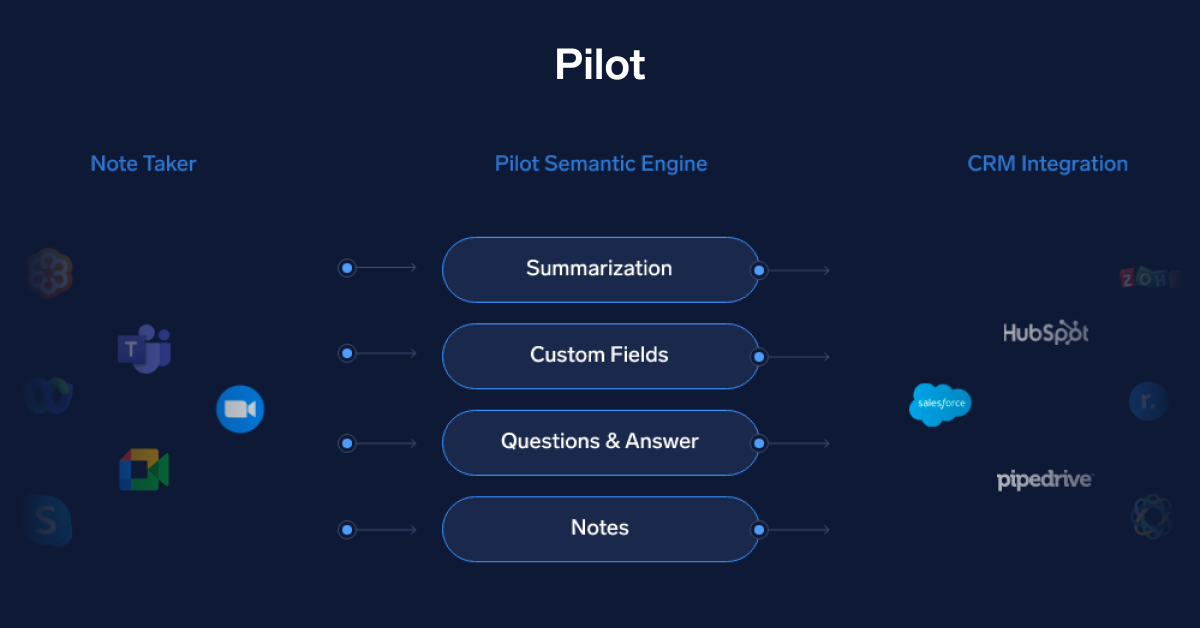Maxwell Lu, formerly a product engineer at Salesforce and the head of revenue operations at a previous startup, found himself frustrated by the task of re-listening to sales calls to write up notes and fill out entries in customer relationship management (CRM) software. Searching for a better way, he decided to build tech that could analyze sales calls automatically — powered by AI — and transfer that information directly into a CRM database.
The tech grew into a company, Pilot AI, that was accepted into Y Combinator’s summer 2022 batch and recently raised $2.2 million from Twitch co-founder Emmet Shear and Dropbox co-founder Arash Ferdowsi, among others. TechCrunch previously covered Pilot AI during Y Combinator’s Summer ’22 batch demo day.
“Large organizations not only produce an incredible volume of calls but also typically have many more teams that can touch a single account, and thus have an even greater demand to unlock this information — and lower the friction of sharing it,” Lu told TechCrunch in an email interview. “Pilot AI doesn’t simply provide suggestions to sales reps, but rather takes over workload entirely from the sales reps and leadership.”
That’s a bold claim. Parsing the hype, though, Pilot AI uses AI to pull information out of sales calls, generating notes and populating CRM fields after the calls conclude. The notes include a summary, any questions asked by the salesperson on the line, prospects’ answers and next steps. According to Lu, one customer is using Pilot AI to fill out 15 different fields in their CRM, replacing a post-call write-up process that took reps up to 20 minutes.
If true, that’s valuable time saved. As per one survey, on average, sales reps spend less than 36% of their time selling products. Published in September 2018, the survey suggests that the majority of sales reps’ time is spent in sales tech, with email for sales-related purposes taking the most time and tools to gather sales intelligence taking the least.

Image Credits: Pilot AI
Other startups use AI to take — or at least attempt to take — the manual work out of sales calls. For example, Winn.ai, which launched out of stealth in September, offers an AI-powered assistant designed to help sales teams track, capture and update CRM entries — much like Pilot AI. Meanwhile, Attention taps AI tech and natural language processing to fill in CRMs after calls and draft follow-up emails.
When asked what differentiates Pilot AI, Lu didn’t make the case that the startup’s tech is necessarily different than what’s already out there. But he did assert that Pilot AI is more streamlined and affordable, pointing to the company’s growing customer base as evidence that it’s doing something right.
“Our customers range from organizations with a modest number of sales reps and much larger sales organizations all the way up to sales teams in established industry leaders such as at Salesforce,” Lu said. “For the intersection at AI sales tools, building a product like this requires a deep understanding not only of the technology but also a nuanced understanding of the business problem — our leadership and our team brings both to the table.”
Lu wouldn’t share Pilot AI’s revenue — or the exact size of its customer base for that matter. But he claimed that the pandemic and macroeconomic slowdown have been a boon for business, actually, because they’ve caused more sales conversations to “happen digitally.”
To Lu’s point, companies are investing in — and investigating — AI for sales more now than they were previously. A 2021 poll by 451 Research found that more than 95% of enterprises considered AI tech to be important to their digital transformation efforts, specifically for the purposes of lowering costs, increasing sales and improving workforce productivity. A separate report from McKinsey implies that AI in marketing and sales has boosted the profits of 79% of companies that have adopted it, thanks to AI’s ability to automate monotonous operations and analyze client data.
“The broader slowdown in tech has actually brought sales leaders’ attention to a business like ours which focuses on boosting the output of their existing team,” Lu said. “Leaders are now looking for solutions like ours because it is far more cost effective to use AI to double down on multiplying the effectiveness of your existing sales team than it is to simply hire more sales reps, which was the go-to approach during the boom times.”
Pilot AI taps algorithms to extract info from sales calls by Kyle Wiggers originally published on TechCrunch







